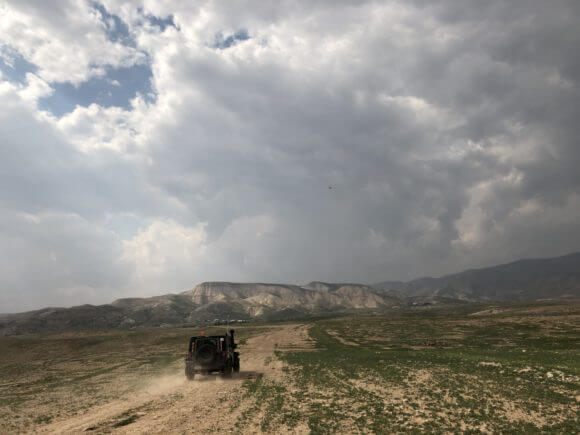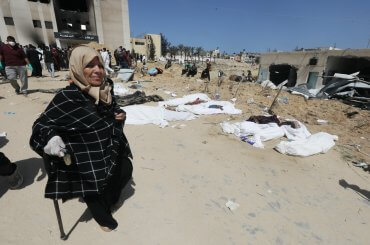With only days left until Election Day in Israel, candidates are doubling down on their proposed policies and promises to voters. For Netanyahu, that means vows to annex swaths of West Bank land, and messages to voters about “Arabs annihilating us all.”
In what many analysts have likened to US President Donald Trump’s presidential campaign in 2016, much of this year’s race for Prime Minister in Israel has been colored by anti-Arab sentiment, race-baiting, and pandering to the far right.
Between Israel and the occupied territories, nearly 5 million Palestinians are living under the control of the state and the occupation, but only a fraction of those with Israeli citizenship — some 1 million people — are allowed to participate in national elections.
Arguably, it is the Palestinians under occupation in Gaza, East Jerusalem, and the West Bank who will be most affected by the outcome of the elections, but they have no say in the matter.
With the topic of this year’s election focused heavily on annexation, the livelihoods of hundreds of thousands of Palestinians living in Area C — the more than 60% of the West Bank under full Israeli control — are hanging in the balance.
Mondoweiss spoke to three Palestinians living in areas of the West Bank– in close proximity to settlements, Area C, and the Jordan Valley — that would likely be the first ones affected if Netanyahu sees his plans through.
Ilham Abu Eid, 70, Beit Jala
Ilham Abu Eid has lived in Palestinian town of Beit Jala, characterized by its large Christian community and sprawling hills famous for its wine and olive oil, all of her life. She was born and raised there, and the land she lives on now was passed down to her from her grandparents.
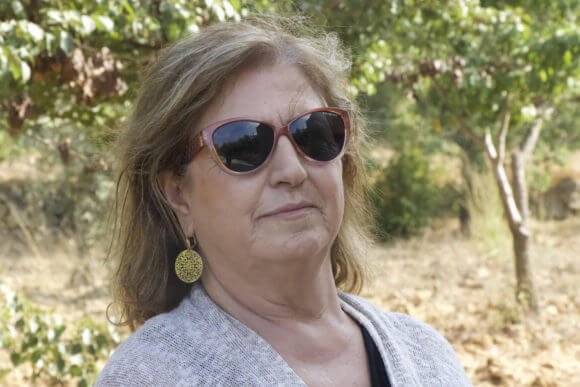
Beyond the hilltop of Beit Jala, which is surrounded by a network of Israeli settlements, walls, and checkpoints, Abu Eid owns land in the Makhrour valley, which has been under threat of confiscation for years.
“Years ago, they built the Route 60 highway on our land [in Makhrour], and recently we received news they want to finish another road for the settlers that will take most of our land for Israel,” Abu Eid told Mondoweiss.
Recounting the losses her family has suffered at the hands of the Israeli occupation over the years, Abu Eid told Mondoweiss: “In Beir Ona, they stole our land, cut our olive trees, and in Makhrour they took our land, and in Cremisan they did the same thing. Most of the land in Beit Jala, and much of our family’s land, has been lost to the settlers.”
She speaks of the difficulties she faces accessing her family’s land in the Makhrour valley, as they have been banned by Israel from paving anything more than a rocky dirt path.
“It is hard, but we walk on it anyways to go to our land because we love it and want to save it. We will not leave our land,” she says. “In the face of the occupation, and the soldiers, and the checkpoints, our lands and our trees are the ones that are suffering.”
It is for these reasons, Abu Eid tells Mondoweiss, she “completely rejects Netanyahu’s speech and statements about annexation.”
“He is doing this so that he can get more votes from the Israelis, but it is we the Palestinians who are always the victims in these Israeli elections,” she says. “Every time they want to have elections, they promise their people to take more land from the Palestinians.”

When asked if she was fearful Netanyahu would follow through on his promises, Abu Eid tells Mondoweiss “of course I am scared that my land will be taken under Netanyahu’s government, and with Trump’s support in America.”
“Nothing is impossible for Netanyahu to do, as long as it means he can be sitting in that chair of Prime Minister at the end of the day,” she continues, saying the results of the Israeli election will disproportionately affect Palestinians like her who are living in or own land in Area C of the West Bank.
“This will affect everything in our life as Palestinians: our freedom of movement, the right of return, our economy, our agriculture, everything,” she says.
Abu Eid sees no difference between Netanyahu and Gantz, or any other Israeli politicians. For her, “they are two faces of the same coin.”
“When you look at all these candidates, all of them go from bad to worse,” she says. “I am sure that there is no Israeli politician who could come and do anything positive for the Palestinian people.”
“We are under one of the toughest situations in the world, under this occupation. You can’t have your freedom, you can’t move inside your country between towns and cities without passing through checkpoints, and you can’t even vote in the elections that decide your fate.”
Rashid al-Khdeirat, 36, Jordan Valley
A husband, father, activist, and farmer, Rashid al-Khdeirat and his family have lived in the northern Jordan Valley of the West Bank for generations.
“My grandfather, father, myself, and my kids were all born here. We have lived on this land and worked on this land long before Oslo and long before it became Area C,” al-Khdeirat says of his family.
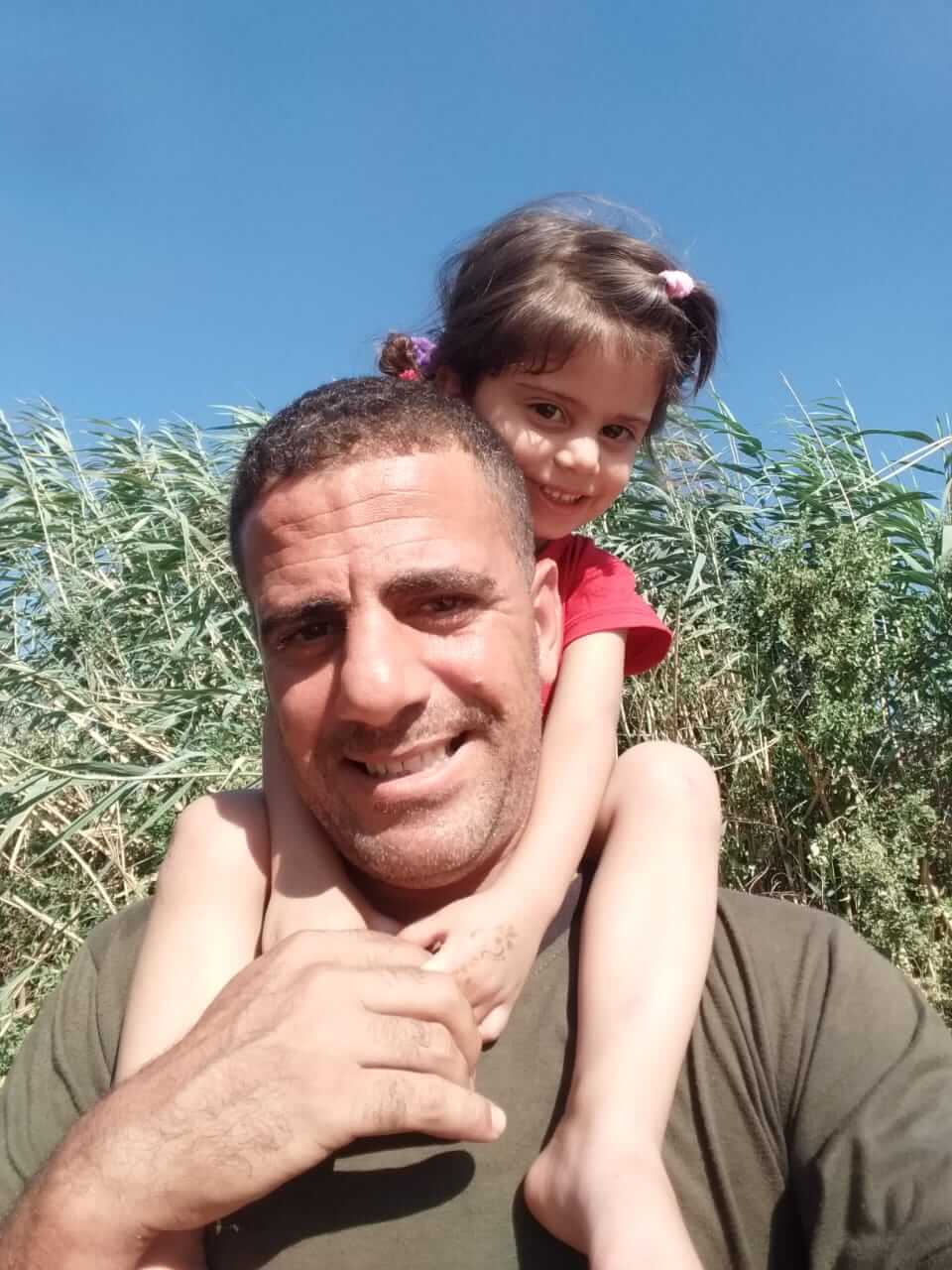
Much of his life, he says, has been characterized by a “clear effort by the Israeli occupation and the settlers to kick us off of this land.”
“Since the 1970’s they have killed and confiscated our livestock, attacked the farmers, destroyed the land, and burned our trees,” he says. “Most of the people in this area are farmers and shepherds, so they think when they kill our animals and trees we will leave this area.”
“After that, they started to pressure us using water. They reduced our water access and confiscated pipe lines, to try and force us out that way,” he continues. “Then they began conducting military training exercises in the area, that scare the local community, and in some cases injure and kill people.”
Upon reelection, Netanyahu told voters the “one place where it is possible to apply Israeli sovereignty immediately after the election” would be the Jordan Valley and the northern Dead Sea area, making al-Khdeirat and his community among the first to be affected by possible annexation.
But for al-Khdeirat, hearing those words were no surprise. “We have seen how for years, through their violent tactics against the Palestinians in this area, they have tried to take the Jordan Valley. Now Netanyahu is simply saying it out loud.”
Echoing the sentiments of Ilham Abu Eid from Beit Jala, al-Khdeirat tells Mondoweiss, “whether it is Netanyahu or his opponents, for us as Palestinians they are pretty much all the same.”
“Yes, we have no say in the matter, but even if I could, I would not vote in the Israeli elections,” he says. “Why? Because we know what their agenda is and what the Israelis want to do.”
“If they try to take our land after the elections we will defend it, we will defend our homes, as we have been doing for years. We will never live under the state of Israel, we will not stand for Netanyahu’s plans. We will only live under a free Palestine.”
Omar al-Qaisi, 60, Battir
Like Abu Eid and al-Khdeirat, Omar al-Qaisi is living on land passed down by his family for generations, in the southern West Bank village of Battir, a UNESCO World Heritage site.
He tells Mondoweiss of the dozens of acres of land he inherited, and all the papers he has to prove it belongs to his family: deeds from the time of the Ottoman Empire, papers from the British mandate, and documents from the Palestinian Authority.
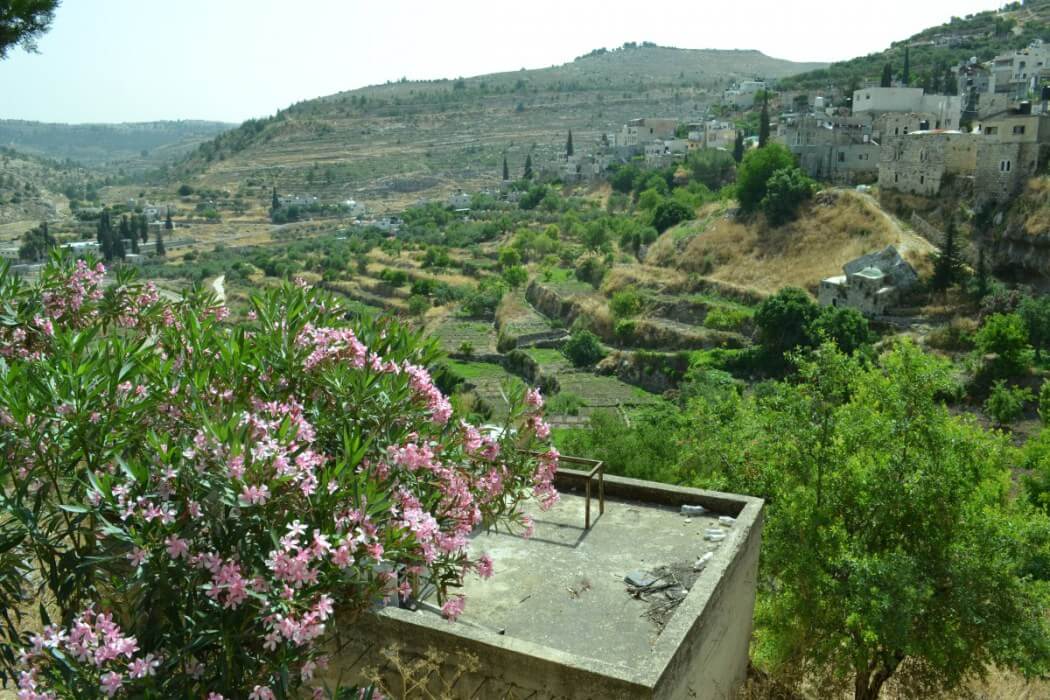
From the 80’s until the present day, he says, it has become increasingly difficult to use the land as his ancestors did.
“The Israelis do not allow us to bring machinery onto our land in order to farm it and harvest it. Anyone that tries to fix their land and farm on it, the Israelis start to make problems for them, take them to court, and try to take the land,” he tells Mondoweiss.
Everywhere in the world, al-Qaisi says, “governments support their people to farm and plant trees, for the environment. Except for Israel. When they see our trees, Palestinian trees, they will do anything they can to uproot them and destroy the land.”
When he saw Netanyahu’s speech, al-Qaisi says he was filled with sadness, but also a sense of validation of “what we have known for years: the Israelis do not care about us, they only want to take as much as they can from us.”
“If they can’t find an existing law to kick us out, they will make new laws to steal our land,” he says.
“Netanyahu’s ideas are not just his own, they are representative of all past Israeli politicians and governments, and the plans that they have been trying to achieve for years. Their political motives are clear: kick Palestinians off the land, take the land, bring in new settlers to live on the land, and then call the land Israel.”
“Netanyahu is not proposing something new, this has all been set in motion long ago.”
With virtually no accountability from the international community, al-Qaisi says he fears Netanyahu will be able to move forward with his plans unaffected.
“They were doing it before, but now they have no qualms about saying it loud and clear, because they know they will not face any consequences.”
“The Israeli elections are going to affect us as Palestinians, especially the farmers and people who live in Area C. This will affect us as Palestinians because we don’t have a choice in deciding who will decide our lives,” al-Qaisi says, adding that Gantz is “no better” than Netanyahu.
“Whoever wins, they will not be different or better than the other. They all have the same goal: to control the land. Maybe the ways they go about it are different, but at the end of the day they are all trying to achieve the same thing. All of these Israeli politicians are only concerned with helping Israel arrive to this goal, of full control of Palestinian land and people.”
Even if he could vote, al-Qaisi says he would not participate in elections, “because the entire system was designed to support the colonial practices of Israel.”
“If I really believed Israel was a true democracy that represents everyone’s interests, yes, maybe I would participate. But how it stands now? Absolutely not.”
Akram al-Waara and Amjad Khawaja contributed to this report from the West Bank.
